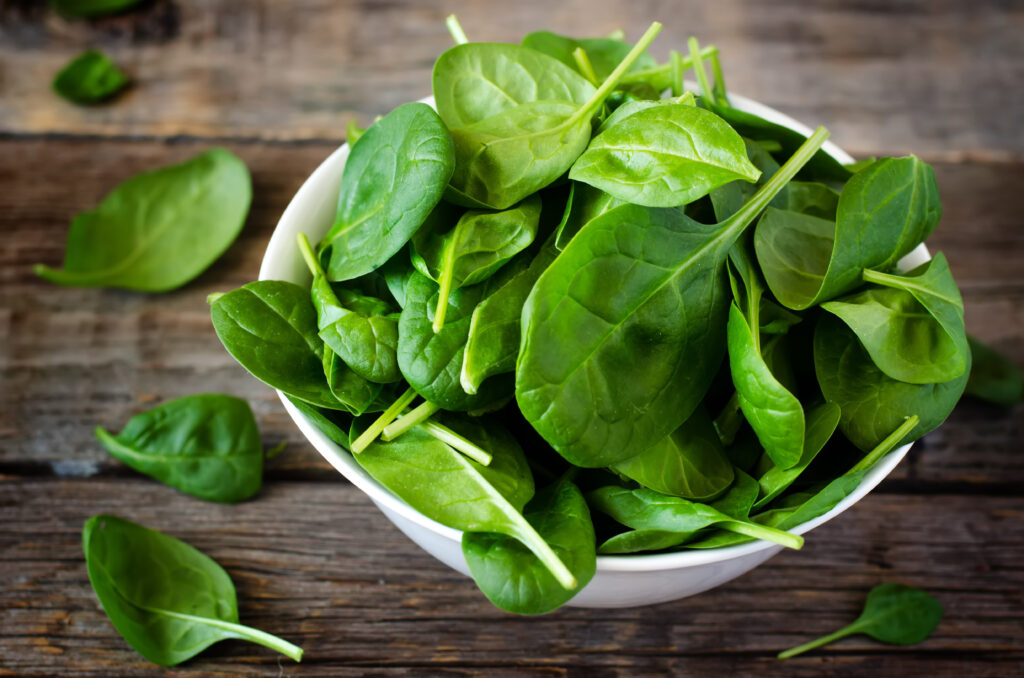
Understand all the ways the mighty leafy green helps your body, raw or cooked.
Of all the leafy green vegetables, spinach is one of the most versatile. You can add it to smoothies, enjoy it in a chilled salad, steam and sauté it as a side dish, add it to a stir fry, and even blend it into baked goods, like brownies.
Spinach also has several health benefits. It contains vitamins and antioxidants that protect from chronic diseases and promote brain, cardiovascular, and eye health. And you can easily add spinach to your meals to maximize those perks.
Here are six health benefits of eating more of this powerfully protective plant and simple ways to incorporate spinach into your meals and snacks.
It’s Full of Nutrients
Per the Department of Agriculture, three cups of raw spinach provide approximately 20 calories, less than one gram of fat, two grams of protein, three grams of carbohydrates, and two grams of fiber.1
Though it has few calories, spinach is full of nutrients. A three-cup portion provides over 300% of the average daily value for vitamin K. The leafy green vegetable also provides over 160% and 40% of the average daily values for vitamin A and vitamin C, respectively. According to the National Library of Medicine, vitamins K and A support strong bones and vitamin C helps heal wounds.2
Spinach also contains 45% of the average daily value for folate, a B vitamin that helps form red blood cells and DNA. It also supplies iron, magnesium, potassium, calcium, and small amounts of other B vitamins.
It’s High in Antioxidants
In addition to its many vitamins and minerals, spinach provides antioxidants that link to anti-inflammation and disease protection.
Some antioxidants in spinach include kaempferol, quercetin, myricetin, and isorhamnetin—also known as flavonoids. Per the Department of Agriculture, flavonoids are compounds that may help protect you against cancer, as well as cardiovascular and inflammatory diseases.3
It Helps Protect Against Diseases
In a study published in 2016 in the journal Food & Function, researchers summarized the protective effects of spinach.4 They stated that the compounds found in spinach could reduce oxidative stress. They also positively influence gene expression—or the “turning on” of certain genes—in metabolism and inflammation. Additionally, those compounds trigger the release of satiety hormones that make you feel full and satisfied after eating spinach.
For those reasons, the researchers concluded that eating more spinach may help curb chronic diseases—including heart disease, cancer, type 2 diabetes, and obesity
It Supports Brain Health
The anti-inflammatory effects of spinach make it a key contender for protecting the brain—specifically in terms of aging.
In a study published in 2015 in the journal Alzheimer’s & Dementia, researchers tracked the eating patterns and cognitive abilities of more than 900 adults aged 58 to 98 years for about five years.5 They observed a significant decrease in the rate of cognitive decline among those who consumed larger amounts of leafy green vegetables than others.
The data also indicated that people who ate one to two servings of those vegetables daily had the same cognitive abilities as those approximately 7.5 years younger than their actual age.
It Helps Manage Blood Pressure
Spinach is also a source of nitrates, which are naturally-occurring chemicals. Nitrates open up or dilate blood vessels. That improves blood flow and eases stress on the heart.
In a study published in 2016 in the Journal of Nutrition, a group of seven women and 11 men consumed four nitrate-rich drinks, including a spinach beverage. The researchers found that the participants’ blood nitrate levels increased after consuming the drinks.6 The spinach drink, as well as the beetroot juice and rocket salad drinks, also lowered blood pressure. Diastolic blood pressure—the bottom number on a blood pressure reading, indicating the amount of pressure in your arteries between heartbeats—remained low for five hours after consuming the spinach and rocket salad drinks.

